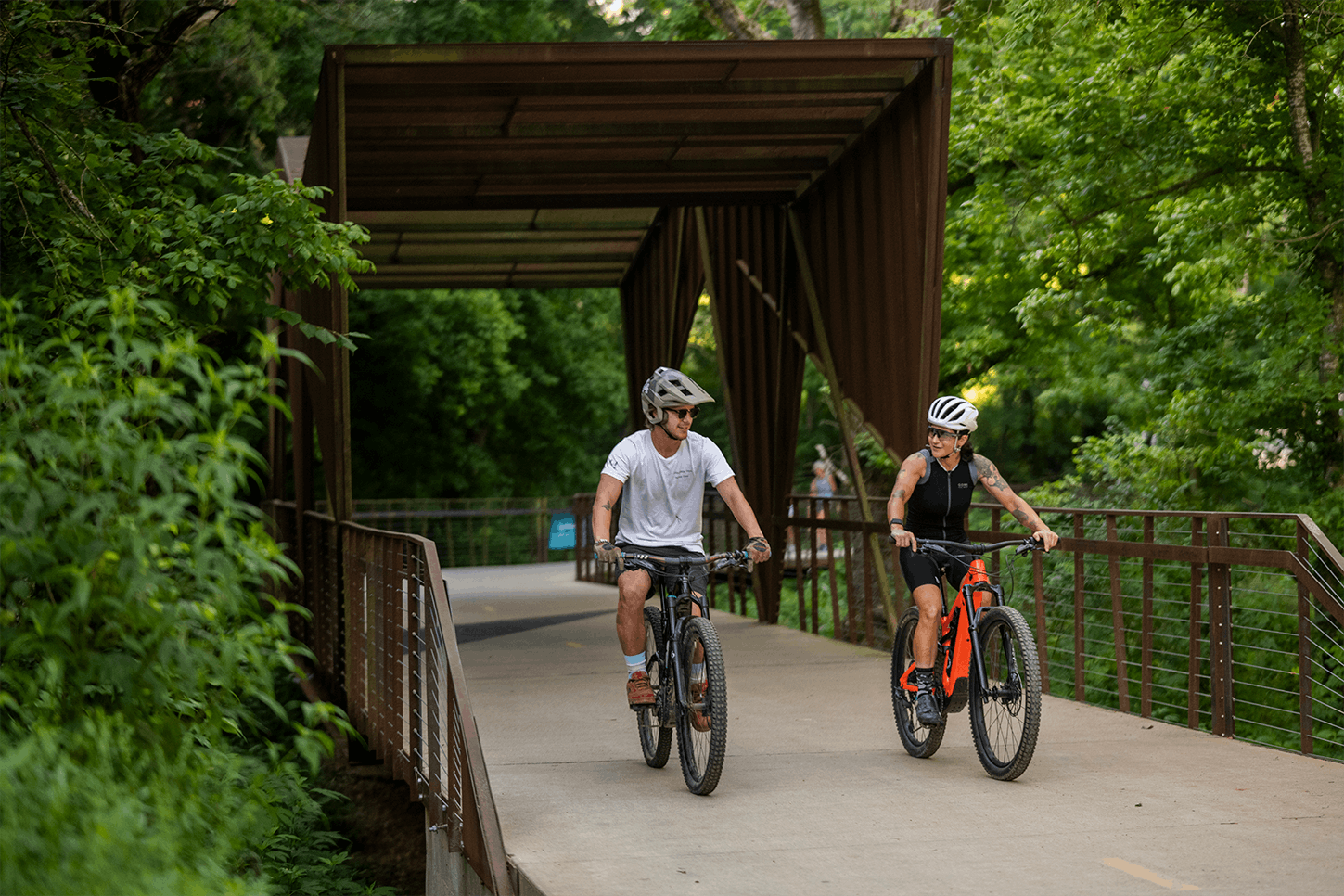2025 eMTB Summit Shapes the Future of Trail Access and Outdoor Recreation
By: Rachel Fussell, senior manager of recreation policy

The summit brought together leaders from across the bike industry, federal and state agencies, advocacy groups, and trail stewardship organizations to discuss challenges and opportunities facing the future of electric mountain bike use across the U.S.
As part of our ongoing work to convene the bike industry around its most complex and high-impact challenges, PeopleForBikes hosted the 2025 Electric Mountain Bike (eMTB) Summit in Bentonville, Arkansas. The summit exemplifies our commitment to uniting business leaders, public agencies, and advocates to advance smart policy, foster collaboration, and strengthen the future of bicycling. By focusing on a rapidly evolving and often misunderstood sector of our industry, the summit brought national attention to the importance of inclusive trail access, responsible innovation, and public-private partnership, all pillars of our work to build a stronger bike ecosystem in Northwest Arkansas and beyond.
The eMTB Summit brought together leaders from across the bike industry, federal and state agencies, advocacy groups, and trail stewardship organizations. The summit emphasized a clear message: eMTBs are not a passing trend — they're a transformational tool reshaping how and where people of all ages and abilities can ride.
As one of the only events focused solely on eMTBs, the summit highlighted their potential to shape the future of trail access and community planning. We collected our top highlights from the event, which featured engaging speakers and experts alongside cutting-edge research and innovations.
Bentonville Leads the Way
The event opened with a compelling welcome from Gary Vernon of Runway Group, who spotlighted Arkansas’ leadership in trail innovation. From integrating eMTBs into state park systems to pioneering sustainable trail design and managing the rise of e-motos on trails, Arkansas is setting a national standard for trail development that expands access and balances community needs.
Research Driving Smarter Policy
A highlight of the summit was a presentation from Jonah Chiarenza of the U.S. Department of Transportation’s Volpe Center, who shared the latest federal research comparing riding behaviors between eMTB and traditional mountain bike users on trails in Moab, Utah. Chiarenza and his team’s findings are critical for land managers navigating trail use policy, offering science-backed insights into the similarities and differences in impacts to trails between riders and helping shape equitable and informed access rules across public lands.
Trail Access Through Collaboration
One of the summit’s most inspiring stories came from Mena, Arkansas. A new downhill mountain bike park — fully open to e-bikes — was brought to life through a rare collaboration between the U.S. Forest Service, Arkansas Office of Outdoor Recreation, Arkansas State Parks, the Arkansas Parks and Recreation Foundation, and the City of Mena. The session underscored the power of public-private partnerships to unlock new recreational opportunities in rural areas.
Innovation for Resilience
Greg Williams of Sierra Buttes Trail Stewardship offered a visionary take on eMTBs as tools for wildfire resilience planning and how trails can be designed not only for recreation, but also to help mitigate fire risk for fire-prone communities. By designing trail networks that serve both recreational and disaster resilience purposes, communities can create infrastructure that supports public safety while expanding access to outdoor recreation.
Policy Insights from D.C.
In a policy session moderated by PeopleForBikes’ Rachel Fussell, Charles Cooper of the Brumidi Group provided a behind-the-scenes look at the evolving landscape of federal e-bike regulations. From staffing cuts at federal agencies to landmark wins like the EXPLORE Act, the conversation highlighted both opportunities and challenges ahead.
Cooper emphasized that reduced federal capacity could delay trail projects and permitting, while the sale of public lands and increased prioritization of extractive industries threaten long-term recreation access. He urged unity among stakeholders, greater engagement with land managers and policymakers, and a push for recreation to be recognized as essential infrastructure. With major funding opportunities like the America the Beautiful Act on the horizon and ongoing questions around eMTB classification, Cooper underscored that the time to act is now — and that the riding community must speak up to shape the future of trail access.
Tackling e-Moto Confusion
As electric mobility rapidly diversifies, one of the summit’s most critical conversations addressed the growing presence of e-motos and out-of-class electric vehicles on trails. Featuring policy leaders including Matt Moore of PeopleForBikes and Scott Schloegel of the Motorcycle Industry Council, the session stressed the need for clear classification systems, user education, and enforcement strategies to ensure safe and fair trail use.
High-Level Takeaways
- eMTBs are reshaping access, increasing inclusivity, and broadening participation across age and ability levels.
- Clear policy and rider education are essential to safely manage eMTB and e-moto growth.
- Public-private partnerships — like those seen in Mena — can unlock new opportunities in underserved areas.
- Trail systems can do double duty, providing recreation and supporting emergency preparedness and fire resilience.
- Federal advocacy matters now more than ever to shape consistent, forward-thinking eMTB access nationwide.
Looking Ahead
With more riders, new technologies, and a changing policy environment, the momentum behind eMTBs is undeniable. From workforce development in the bike industry to fire-hardened trail prescriptions and federal engagement, PeopleForBikes is proud to support the future of eMTBs. The 2025 eMTB Summit was a catalyst for action, collaboration, and change.
As one U.S. Forest Service attendee summed it up:
“I learned more [during the eMTB Summit] than I have in the last two years about eMTBs. I wish all my staff could attend.” — Dan Olsen, Forest Supervisor, Ozark-St. Francis National Forests
PeopleForBikes couldn’t agree more.
____________________________________________________________________________________
PeopleForBikes thanks all the partners, speakers, and attendees who made this groundbreaking event possible. Together, we’re building a future where more people can ride more places, more often.
Related Topics:
